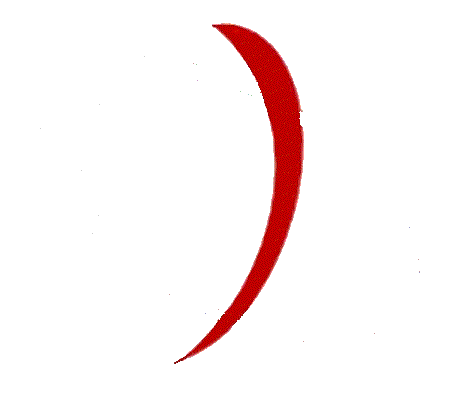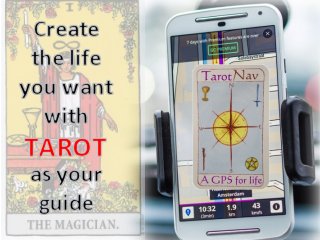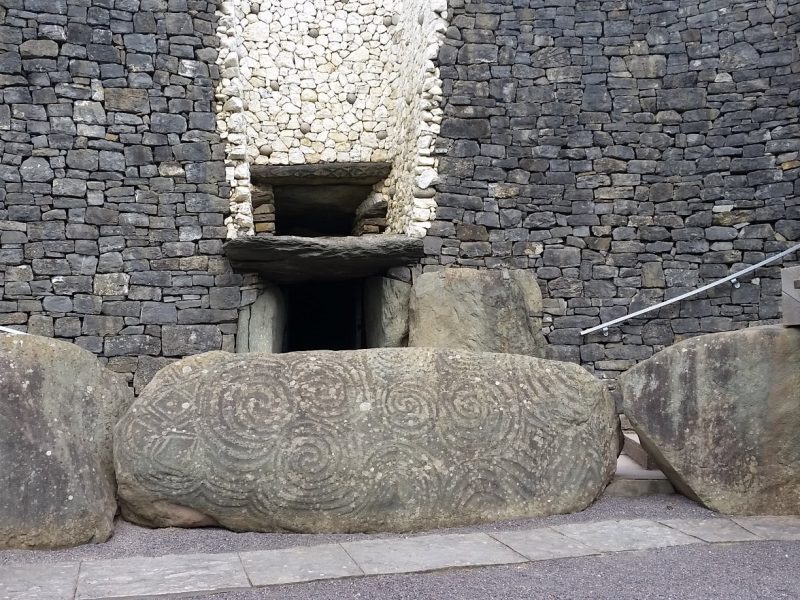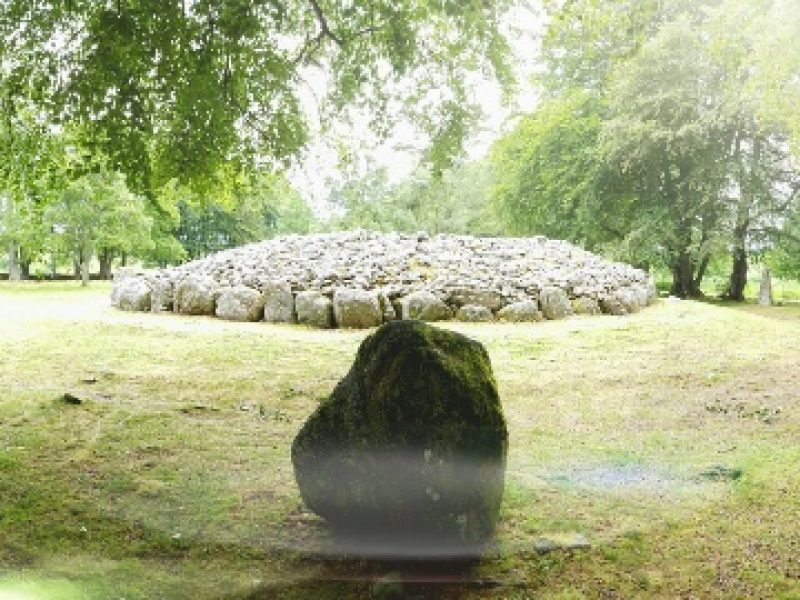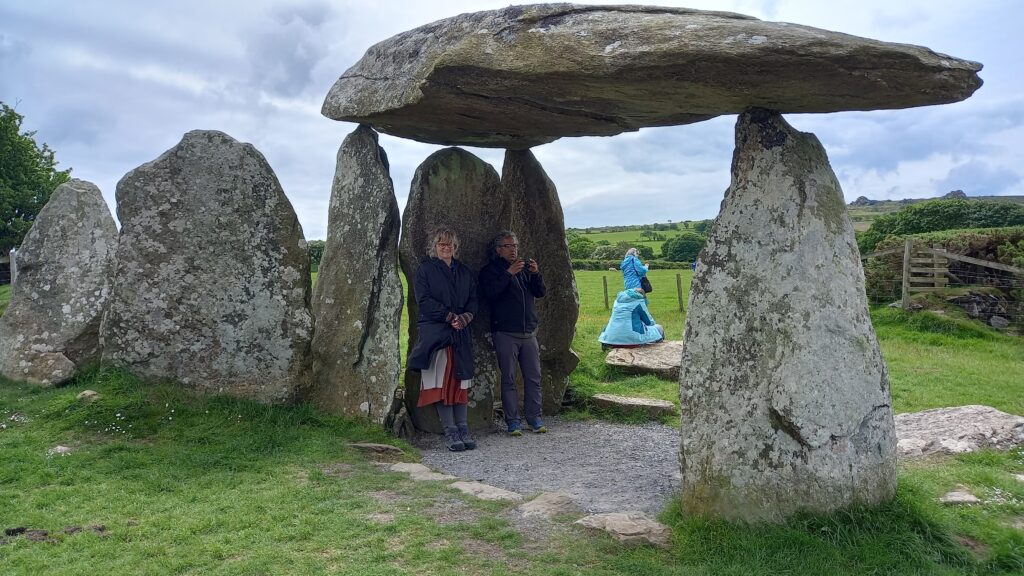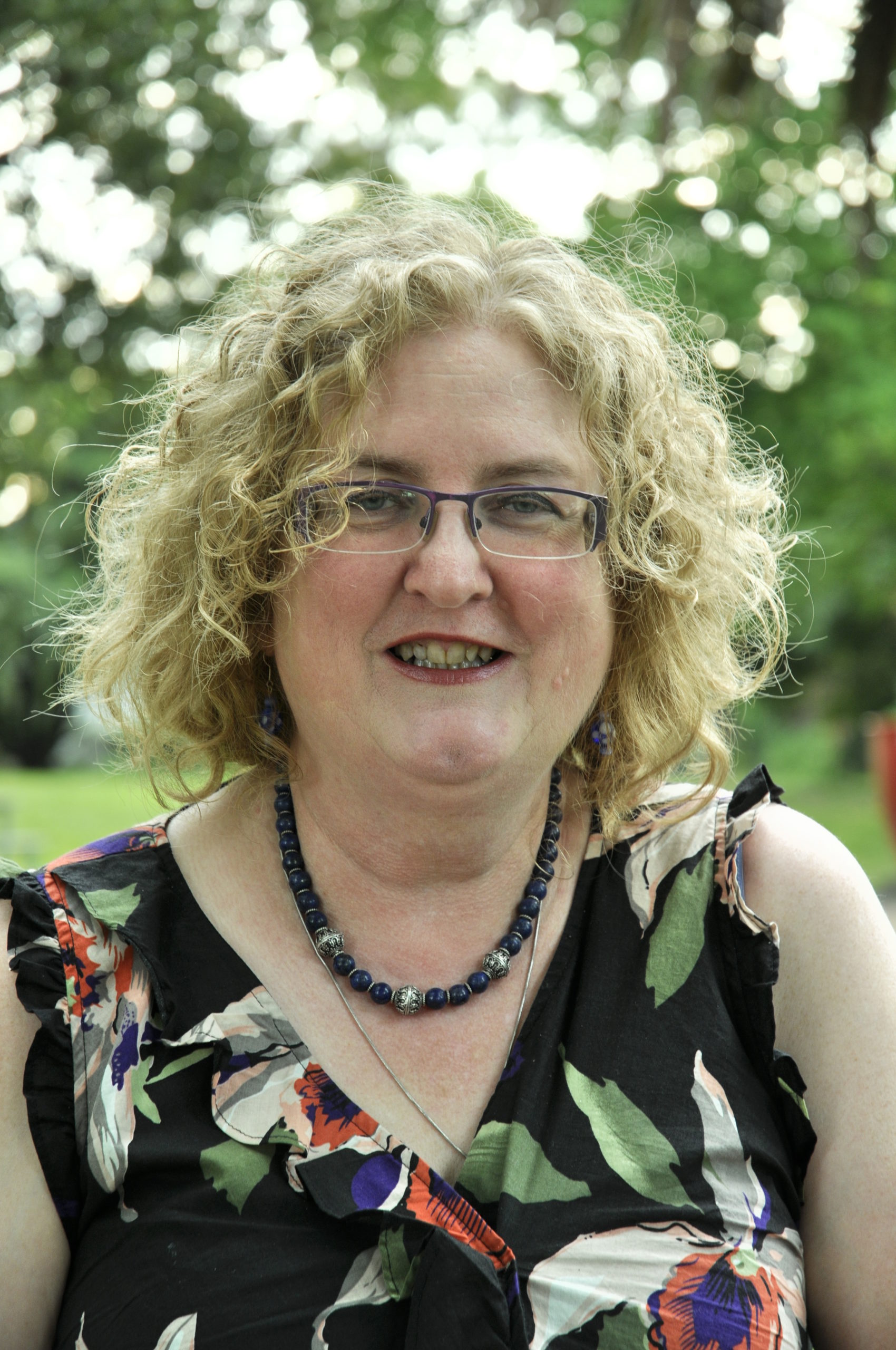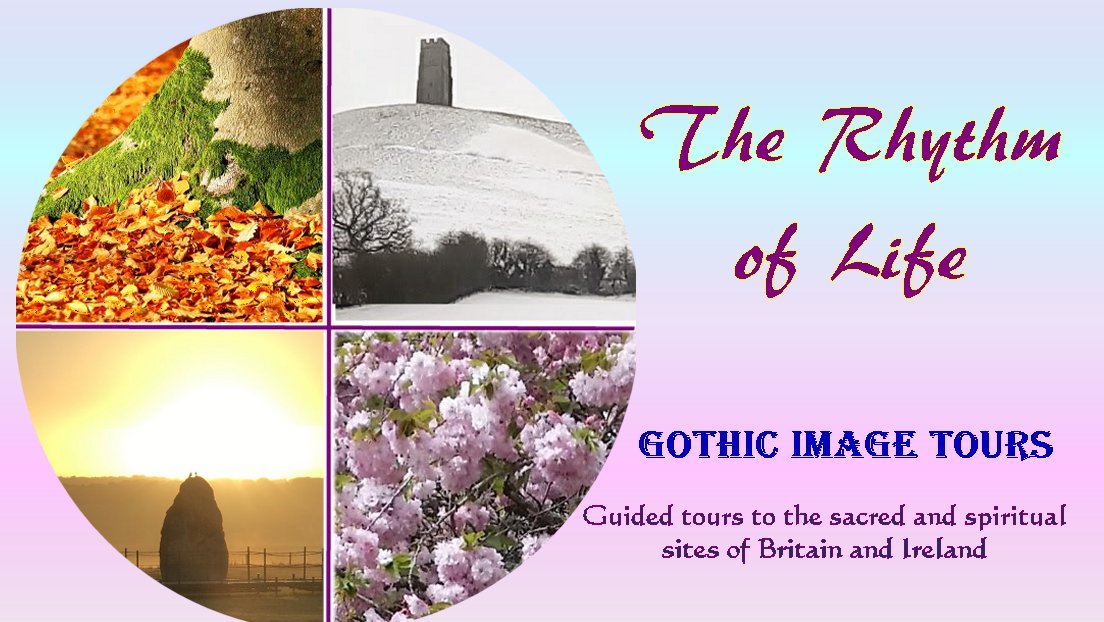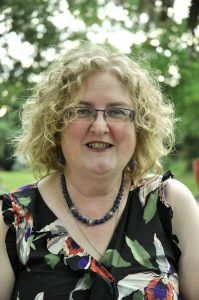 Jenne Perlstein offers a ground-breaking course for tarot readers on Global Spiritual Studies. The course, Client Skills for Tarot Readers, is the only one of its kind in the world. It’s designed to help esoteric readers understand what makes people tick, what really lies behind the questions clients ask when they come for a reading or consultation. Armed with this knowledge, readers can feel much more confident about discussing the wide range of issues clients bring through the door.
Jenne Perlstein offers a ground-breaking course for tarot readers on Global Spiritual Studies. The course, Client Skills for Tarot Readers, is the only one of its kind in the world. It’s designed to help esoteric readers understand what makes people tick, what really lies behind the questions clients ask when they come for a reading or consultation. Armed with this knowledge, readers can feel much more confident about discussing the wide range of issues clients bring through the door.
As a professional Tarot reader and former President of the Tarot Guild of Australia, I highly recommend this course as a way of improving the way you engage with clients. A side-benefit is that you learn a lot about yourself and people you know. I definitely had many an ‘Aha’ moment as I worked through the material! Read on to see why the course is a professional development opportunity not to be missed.
LINDA: You refer to yourself as a Tarot counsellor – how is this different to being a Tarot consultant?
JENNE: It’s different because I combine Tarot with counselling and psychological skills. I’ve worked for many years as a social worker which gives me acces. to practical social and health resources. I have a medical degree which included training in psychiatry and psychology. Some of the approaches I learned there overlap with the ‘archetypal’ or universal unconscious ideas present in the energies of the Major Arcana. For example, the Mother archetype is present in The Empress and The Moon and you see the child archetype in The Fool and The Sun.
My readings vary in terms of the balance between Tarot and counselling. Some consultations are typical Tarot readings with questions from clients, followed by interpretations, insights, likely directions or clarity re decisions. At the other end of the spectrum, some of my consults have involved one card only with the rest being counselling!
LINDA: How do you decide which way to go?
JENNE: I take my lead from the client – their needs, pressing issues, psychological state (particularly their inner strength), vulnerability, self awareness and insight. Each reading is like a ‘see saw’, changing and moving between Tarot reading and counselling, lead by the client. I also offer ‘straight ‘ counselling, if a client prefers a non Tarot approach .
LINDA: What sort of counselling skills do you use when you’re doing readings?
JENNE: Reflective listening, empathy and a non judgemental stance. That may sound obvious, and we all aim to do it, but sometimes we bring our own issues into sessions and they can get in the way. All I can say is that this approach , when consciously applied, works! Fifty percent of the effectiveness of counselling sessions can be attributed to counsellors adopting a non judgemental stance.
Mine is an ‘eclectic’ approach, using what are generally regarded to be the best elements of all systems. To name a few: problem solving approach, cognitive behaviour therapy, transpersonal, transactional analysis especially in family of origin issues and relationships.
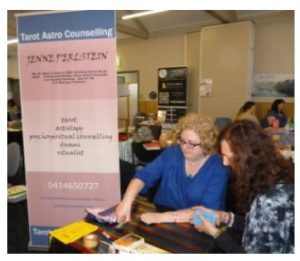 LINDA: How do you describe your style of reading to potential clients? What sort of outcomes can they expect if they come to you for a reading?
LINDA: How do you describe your style of reading to potential clients? What sort of outcomes can they expect if they come to you for a reading?
JENNE: I tell them that it’s a dialogue – “the more you tell me the more ‘accurate’ I can be”. I think of myself as ‘clairsentient’ (with strong feelings about people and inner feelings) and ‘claircognisant’ (knowing something deeply about a particular path). Outcomes? Greater emotional and situational clarity, confirmation of a particular direction or decisions made, drawing out of an issue that has been pushed away, relationship guidance and reassurance.
LINDA: Are your readings predictive?
JENNE: There can be a predictive element but I’m not a clairvoyant. For example, the cards may indicate a direction for a current situation, or the consequences of decisions. Sometimes they indicate an outcome that isn’t currently clear but which manifests later. They may indicate timing or how intense or difficult a situation is, they may show where a client needs to change something about a situation to change the outcome.
LINDA: What sort of topics do you cover in your course and master classes?
 JENNE: Lots! Ethics, boundaries, insight into one’s self as reader, types of counselling and psychological therapies e.g. problem solving, Jung, Freud, cognitive behaviour therapy (CBT) and so on. We also explore family of origin issues, attachment, child development and parenting, as they relate to adult relationship issues. I cover common mental health issues such as depression, managing suicide threats, major psychiatric disorders and personality disorders.
JENNE: Lots! Ethics, boundaries, insight into one’s self as reader, types of counselling and psychological therapies e.g. problem solving, Jung, Freud, cognitive behaviour therapy (CBT) and so on. We also explore family of origin issues, attachment, child development and parenting, as they relate to adult relationship issues. I cover common mental health issues such as depression, managing suicide threats, major psychiatric disorders and personality disorders.
There are two master classes which cover specific issues taken from the course. These are Tuning into ‘difficult’ clients and The secret ingredient for effective relationship readings.
LINDA: Can you give us examples of how some of the theoretical aspects of your classes can be applied in a Tarot or esoteric reading?
JENNE: A problem solving approach helps you get clients focussed on possible options or outcomes when they’re ‘stuck’. You can employ the technique of ‘immediacy’, e.g. naming the ‘elephant in the room’. You can handle a resistant client by acting ‘naive’.
A basic understanding of human behaviour gives you greater confidence in setting boundaries. You can see when problems lie with the client, rather than thinking your reading skills are at fault. You feel more confident about managing obsessed clients, the ones who repeatedly ask ‘when is he coming back to me? When will he leave his wife?’ You can also recognise signs that might indicate mental health problems and feel confident about referring them to health professionals who might be able to help.
LINDA: Who’s the main target group for your course and master classes and what will they gain from doing them?
JENNE: Anyone in the Tarot, astrology, Reiki or other esoteric fields, irrespective of whether they’re newcomers or experienced readers. By investing in the course, which includes online discussion forums at regular intervals during the year, readers will become far more confident when faced with distressed or challenging clients, particularly those with repeated relationship, family or interpersonal difficulties. They’ll be able to deliver challenging or sensitive interpretations with greater confidence.
The course doesn’t make you a counsellor. It recognises that Tarot readers may use counselling skills unconsciously and doing the course is a way of expanding those skills. For readers with counselling backgrounds it’ s a refresher and places these skills in the Tarot context in the internationally growing area of Tarot Counselling. At the New York Tarot and Psychology Conference and Readers Studio this year I met many colleagues from this field – Katrina Wynne, James Wells and Art Rosengarten. It’s an exciting new aspect of Tarot.
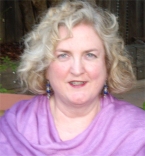 About Jenne Perlstein
About Jenne Perlstein
Jenne Perlstein, MBBS (Medical Bachelor, Bachelor of Surgery), BSW (Bachelor of Social Work), Cert. 4 TAA, AASW; Cert.Appl Astrology(Astro Synthesis) is a widely experienced social worker with more than 25 years experience. She also has a degree in medicine, including study of psychology and psychiatry.
Jenne is a Professional Member of the Tarot Guild of Australia, and has been reading tarot for almost 20 years. She is also an astrologer, having studied at the Chiron Centre in Melbourne in 1997.
As a social worker she uses her medical knowledge in her work which encompasses counselling, family work, case work, community development, policy and extensive work in education. She has worked in Australia and the UK in the areas of aged care, brain injury, mental health, vocational rehabilitation and Aboriginal justice.
Jenne has a passion for the psycho-spiritual, and in addition to the above, has studied and participated in Kabbalah, meditation, Jungian psychology and primal therapy. For more information visit Jenne’s website, Tarot Astro Counselling.
Over to you!
Try out this spread which Jenne demonstrates in the master class on doing effective relationship readings. Jenne explains that the quality of the relationship we had with our parents as children and young adults (particularly with our mother or main early carer) influences how we attach in romantic relationships as adults. The main attachment styles are:
- secure and trusting
- diminished ability to articulate feelings
- anxious – demand reassurance
- ambivalent – vacillate between attachment and hostility.
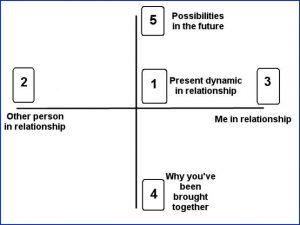 Use the spread to gauge the dynamics and the journey of a relationship. Cards 2 and 3 can indicate the attachment style, while card 1 provides a picture of the dynamic operating between the two people now. The Two of Cups in position one, for example, would indicate that the two people are currently enjoying a harmonious and equal relationship. One would expect cards in positions 2 and 3 to support this (e.g. the Ace of Cups, Nine of Cups, Four of Wands). If a card in either position 1 or 2 didn’t support the Two of Cups, e.g. the Nine of Wands, you could interpret this as indicating that the person concerned could be anxious and doubting and needing reassurance.
Use the spread to gauge the dynamics and the journey of a relationship. Cards 2 and 3 can indicate the attachment style, while card 1 provides a picture of the dynamic operating between the two people now. The Two of Cups in position one, for example, would indicate that the two people are currently enjoying a harmonious and equal relationship. One would expect cards in positions 2 and 3 to support this (e.g. the Ace of Cups, Nine of Cups, Four of Wands). If a card in either position 1 or 2 didn’t support the Two of Cups, e.g. the Nine of Wands, you could interpret this as indicating that the person concerned could be anxious and doubting and needing reassurance.
We’d love to hear how you find this layout. Did the cards give you a clear picture of the attachment style of one or both people in the relationship? Or just let us know which cards you would associate with each of the attachment styles. We look forward to hearing from you.
